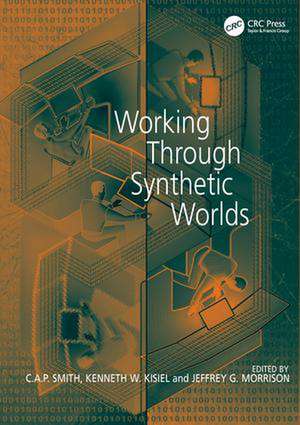Working Through Synthetic Worlds
Autor Kenneth W. Kisiel Editat de C.A.P. Smithen Limba Engleză Hardback – 28 noi 2009
Preț: 1107.17 lei
Preț vechi: 1560.23 lei
-29% Nou
Puncte Express: 1661
Preț estimativ în valută:
211.89€ • 220.39$ • 174.92£
211.89€ • 220.39$ • 174.92£
Carte tipărită la comandă
Livrare economică 14-28 aprilie
Preluare comenzi: 021 569.72.76
Specificații
ISBN-13: 9780754677123
ISBN-10: 0754677125
Pagini: 446
Dimensiuni: 174 x 246 x 33 mm
Greutate: 0.95 kg
Ediția:1
Editura: CRC Press
Colecția CRC Press
ISBN-10: 0754677125
Pagini: 446
Dimensiuni: 174 x 246 x 33 mm
Greutate: 0.95 kg
Ediția:1
Editura: CRC Press
Colecția CRC Press
Cuprins
Contents: Foreword; Preface; An essay on the cognitive benefits of stories, C.A.P. Smith; Part 1 Forecasting: The future of the market research profession, Paul R. Messinger and Xin Ge; Synthetic worlds and financial services, Richard Brath, Mike Peters, Joseph MacInnes and William Wright; A day at a 3D datacenter, Michael Osias, Joan L. Mitchell, Donna Eng Dillenberger, David Ward and Sandra K. Johnson; Hypothesis-testing in a biological cartographic virtual world, John W. Bodnar, Russ Vane and Brian Rogers; System dynamics and synthetic worlds, Warren Tignor; Analytical world environments, Vadim Slavin, Randy Stiles and Thomas Trinko. Part 2 Forensic Analysis: Smart, collaborative workspaces in the information ecology, John Miller, Greg Nuyens, John Light and Cynthia Pickering; Synthetic worlds in national security policymaking, Ed Waltz; Synthetic worlds for intelligence analysis, Jeffrey G. Morrison, Kenneth W. Kisiel and John DeBello; Augmented reality tools for enhanced forensics simulations and crime scene analysis, Robert Rice. Part 3 Cognitive Amplifiers: Synthetic worlds for on-demand experience, Kenneth W. Kisiel; Synthetic worlds and characters, and the future of creative writing, Selmer Bringsjord and Alexander Bringsjord; Virtual rehabilitation: synthetic worlds to address disabilities, Maria T. Schultheis, Lisa K. Simone and Ana C. Merzagorra; Use of a synthetic world for negotiation and consensus building, Diana Burley. Part 4 Training: A day in the life of Airman Basic Smith, Peter Garretson and Nathan T. Denny; Mirror Man: a speculative case study of the synergetic potential of data visualization and virtual worlds, Ben Goertzel; Turing, androids and a travel holiday: a futuristic view of synthetic worlds, Robert Cox, Patricia Crowther and John Campbell; The cognitive playground: fostering critical and creative thinking with synthetic worlds, Judi McCuaig, Joe MacInnes and William Wright. Part 5 Infrastructure: A day in the life of a usability engineer, Theresa A. O'Connell, Elizabeth D. Murphy and Renate Roske-Shelton; InfoSec in synthetic worlds: historical perspectives from MOs, MUDs and MMOGs, Jeffrey M. Stanton; Index.
Notă biografică
Dr C.A.P. Smith has an engineering degree from M.I.T. and a Ph.D. in Information Systems from the University of Arizona. He has more than 20 years of experience with research into decision-making in stressful conditions. He is an expert in the design of decision support systems and the application of Human Factors to Human-Computer Interfaces. Dr Smith's scholarly research has been published in numerous journals such as Human Factors, Group Decision and Negotiation, International Journal of Human-Computer Studies, and International Journal of Human-Computer Interaction. He recently spent 3 years working as a Senior Scientist for the US Navy's Space and Naval Warfare Systems Center where he managed several research and development projects. Kenneth W. Kisiel is Principal Research Engineer, Lockheed Martin Corporation. Mr. Kisiel is a Senior Technical Advisor assisting clients in applying virtual/synthetic worlds to information understanding. He has more than 30 years' experience in emergent technology consulting specifically related to information analysis and understanding. Mr. Kisiel was also the founder, CEO, and visioneer for WisdomBuilder, LLC which researched and commercialized advanced visualization analytical tools to both the government and private sectors. Mr. Kisiel holds patents in visualization and social network analysis. He earned a B.A.S from Florida Atlantic University and an M.S. from Johns Hopkins University. Dr. Jeffrey G. Morrison earned his Ph.D. in Psychology from the Georgia Institute of Technology. He has been a scientist with the U.S Navy since 1990, where he has led a number of research and development efforts in the fields of: cognition, decision support, advanced automation, and human factors. He is currently on assignment to the Office of the Director of National Intelligence (ODNI) as a program manager with the Space and Naval Warfare Systems Center - Pacific. Dr. Morrison received the Dr. Arthur E. Bisson Prize for Naval Technology Achievement from the Office of Naval Research for his work in developing and transitioning "Knowledge Web Technologies", which were instrumental to Naval operations during both Operation Enduring Freedom & Operation Iraqi Freedom. He has received numerous best paper awards as well as the American Psychological Association's George E. Briggs Dissertation Award, for original research exhibiting creative application of scientific inquiry in the area of engineering psychology.
Recenzii
'This book charts a course for truly valuable, useful research and presents a future that will impact how we all "get things done" beyond mere games and social networks. The Internet initiated the journey; this book shows that the effective use of immersive worlds is the destination we've all been awaiting. Those who understand how to use virtual world technologies will succeed; those who do not are doomed to failure.' Dylan Schmorrow, Commander, Medical Service Corps, United States Navy
Descriere
Working Through Synthetic Worlds explores different tasks that might benefit by being performed within a synthetic world. The term 'synthetic world' refers to a subset of virtual environments, having a large virtual landscape and a set of rules that govern the interactions among participants. Currently, their primary motivators appear to be fun and novelty. If synthetic worlds are to prosper the non-game-oriented worlds will need to facilitate business processes to a degree that exceeds their substantial costs for development and maintenance.







